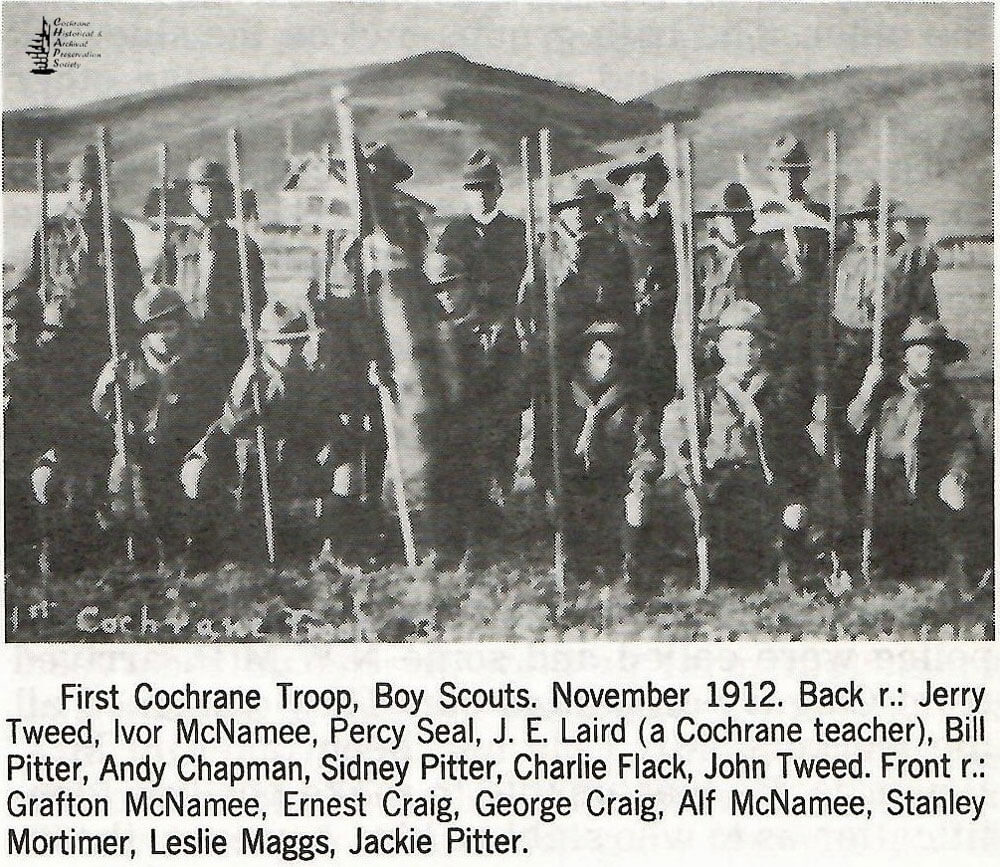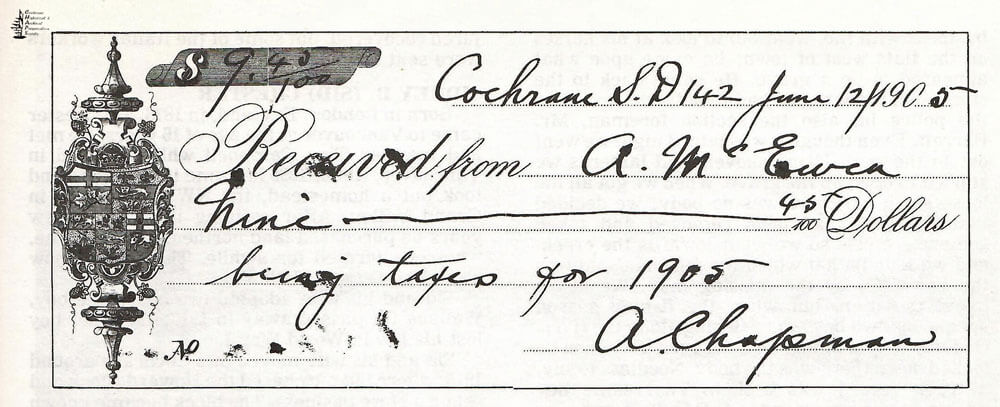by Ruth Vanderburgh Big Hill Country pg 208
Andrew and Robert Chapman, twins, were born in Argyll, Scotland. They came to Canada, arriving in Calgary in 1899. Robert went on to Banff, Alberta, and found work in a general store owned at that time by Dave White. Andrew remained in Calgary, finding work with the C.P.R. where he remained until 1902, at which time he decided to go to Banff and join his brother, Robert. In 1903, in partnership with Dave White, Andrew came to Cochrane and set up a general store business. Robert came to Cochrane with him and went into the carpenter business. The carpenter business proved to be more lucrative so Andrew sold out his interest in the store and he and Robert formed a contracting business and worked in and around the Cochrane area. Their first large building was the C. W. Fisher block. In 1909 they built the Saint Andrews United Church. Other buildings erected by them, some still standing, are the Gulf Garage, and the two-storey brick house beside the garage, where Mr. and Mrs. Chapman made their home. The garage was built in 1918. In 1916 they built a butcher shop for Ernie Andison; this is used today for a laundromat. They put up many farm buildings, among them a frame house and barn for the Countess Bubna and a large home for Arthur Crawford.
Andrew went into local politics and in 1906 became the Mayor of Cochrane village. In 1912 he became Postmaster, a position he held until 1949. When they built the Chapman Brothers Garage, Robert took over the management of it and continued to operate it until it was sold to Marshall and Jim Baptie in 1935.
Andrew was a member of the Orangemen’s Order, Superintendent of the Sunday School, and both he and his brother took a keen interest in curling. Robert was an avid fisherman. Soon after the sale of their garage, Robert passed away. He had never married.
In 1918 Andrew married Margaret Seal. She joined him as Postmistress and worked with him until his retirement in 1949. Andrew was also Police Magistrate in Cochrane for six years. He and his wife did not have any children.
Upon retirement from the Post Office, Andrew and his wife moved to Victoria, British Columbia. Margaret passed away in 1959 and Andrew in 1961. Both were cremated and their ashes were strewn on the Juan de Fuca Straits, near Vancouver.
The following was taken from Andrew Chapman’s memoirs and was sent by his sister-in-law, Ruth Vanderburgh.
In 1903 when I arrived in Cochrane there were three churches, all well attended, one store and one hotel. People were honest folk then, a locked door just wasn’t. The Presbyterian Church
which I attended, had services in the afternoon and evening. It became too small and a new one was built and except on special occasions, it has been too big ever since. We had no police force in residence back in 1903, but there was an occasional patrol made by the N.W.M.P. I do not want you to think because of what I have said that there was not any crime; we had a murder in 1905, a man of Hungarian nationality was working on the C.P.R. section all summer and one night he disappeared. He was in the butcher shop in the evening and when he left the shop that was the last time he was seen alive. The next morning the section foreman was short one man, and while questioning his crew he noticed that one of the men had a badly scratched face. When asked about it, the man said he had scratched it on some brush. About three days later the man with his face scratched, up and disappeared. The mounted police were notified. They suspected murder and a search took place. Several local townspeople and the mounted police went out but they were unable to find anything. In the spring, Mr. Howard who was a partner in the store business with me, went out to look at his horses on the flats west of town; he came upon what appeared to be a grave. He came back to the store, told me what he had found, and we called the police in, also the section foreman, Mr. Barrett. Even though it was late at night we went out to the spot. Using shovels and lanterns we started to open up the grave. When we got all the loose earth out there was nobody; we decided that the body had been removed and taken somewhere else so we went towards the creek, and we found a hat which the foreman said was the hat worn by the missing man. We never found the man, but when the fishing season opened up, two boys were fishing along the river. One boy was standing on a big rock and when he looked down there was the body. Needless to say, a track record was broken. That same boy became an engineer on the C.P.R. in later years and we often joked about it.
About 1908 a smallpox epidemic broke out. The family that was delivering milk to the people in town came down with it first and it spread like fire. Tents were put up down by the river and everyone with smallpox was sent there. I recall guards being put on the roads entering the town so people could not come into the town; guards were even at the railway station. One of the teachers was Miss MacIntosh and she got smallpox. When the epidemic was over, members of the village council had to go to every house with disinfectant. All those residing in the house had to have a bath using it, no bathrooms in those days, just a galvanized tub in the middle of the kitchen floor. When everyone was thoroughly disinfected, the children went back to school.
A second hotel was built and this was indirectly the cause of a riot. Cowboys of the area formed the habit of having a few drinks at one and then going to the other to see if the liquor was any better. On this particular day, there was an extra gang of C.P.R. workers in town. They were doing the same as the cowboys, going from one place to the other. Both groups met on the sidewalk about midway and neither would let the other pass so a real fight broke out. The C.P.R. workers went to their boarding cars and armed themselves with guns and knives. They came back with every intention of cleaning up on the cowboys. The bricks for putting on the outside of the hotel were all in piles around the building. The cowboys used them for their ammunition; it did the job all right, men soon started scattering, then a chap stepped out on the hotel verandah and with the use of a scatter gun soon dispersed the remaining rioters. Ed Cole, a very innocent bystander, was stabbed in the abdomen. The police were called and some N.W.M.P. arrived from Calgary on a handcar. They disarmed all the workers. Mr. Cole had been taken to Mrs. Howards. He was unable to make a positive identification as to who stabbed him, however, the injured recovered, but some of the Italian workers were sent to jail for awhile.


